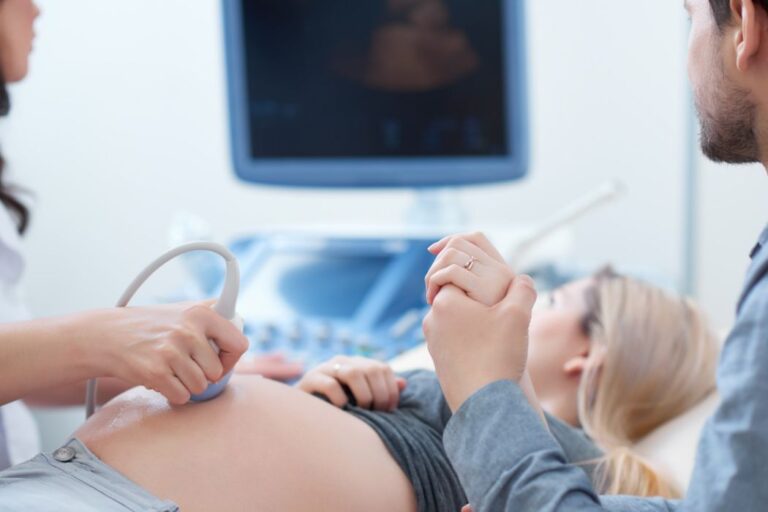
Discovering your body is housing a tiny little human is mind-blowing and incredibly exciting in equal measure. This life-changing revelation will undoubtedly make you wish to know how your baby grows and develops each week towards the delivery day.
This blog looks at the check-ups and scans you and your baby can come in for during your pregnancy and what you will learn about your baby during each scan.
First Trimester Scans
Early Pregnancy Scan (6-11 weeks)
6-11 weeks is the first time you can get a private pregnancy scan – it isn’t one that the NHS ordinarily offers. This type of scan is primarily to reassure you that you are indeed pregnant and that everything is looking normal so far.
If you have been experiencing unusual symptoms like pain or vaginal bleeding, this can be hugely reassuring at such an early stage. During this time, your baby grows at around 1mm daily.
NT Scan (11 – 13 weeks)
Your NT (nuchal translucency) scan is a detailed anatomical survey – at private clinics, this will be more extensive than those carried out on the NHS.
A nuchal translucency test measures the nuchal fold thickness, a tissue at the back of your baby’s neck. From testing this tissue, your clinical can accurately identify if your baby has Downs Syndrome or another genetic condition.
Second Trimester Scans
Gender Scan (16 – 32 weeks)
This well-being and gender scan give you insight into whether your baby is a boy or a girl.
Of course, many parents wish for this to be a surprise on the big day when their baby comes out into the world. But if you’re itching to find out earlier than this, a gender scan is when you can find this information out (the gender scan is 99% accurate in establishing your baby’s gender.
This is also an opportunity to look at your baby’s development: you can have this type of scan at any point up until delivery time.
Anomaly Scan (19-22 Weeks)
Whilst the first-trimester scans keep track of your baby’s early development and diagnose potential complications, second-trimester scans are more accurate in identifying abnormalities.
During this 19-22 week scan, your clinician can offer more detailed and accurate information about your baby’s growth and well-being. By this stage, it’s possible to measure each part of your baby’s anatomy, such as the skeleton and internal organs.
Third Trimester Scans
4D Scan (24-34 Weeks)
By this stage, your baby’s face and eyelashes, eyebrows and hair are fully formed. Whilst his or her eyes will have formed, they will yet to have developed colour.
Generally, the NHS only performs this scan if the mother has gestational diabetes. The value of this important scan has been highlighted by the likes of Professor Nikolaides, a world-leading obstetrician, who believes the 4D scan could prevent stillbirths, which are at a high rate in the UK.
Growth Scan (24-36 Weeks)
The growth scan is when your baby starts to practice acts like swallowing, sucking and breathing, developing its personality from inside your womb!
This time is also when the digestive tract has developed, and brain tissue continues to evolve. This can be a fascinating scan, as it’s an opportunity to see your baby from the inside and its evolving idiosyncrasies in greater detail for the first time.
Cervical Length Scan (16-40 weeks)
It’s possible to have a cervical length scan at any stage between 16 and 40 weeks. This scan measures the length of the cervix (as indicated by the name!), which helps your clinician identify how well-sealed your cervix is.
A cervical scan may be advised if you are expecting twins, have given birth prematurely in the past, have had surgery on your cervix, or had a weak cervix in a previous pregnancy.
If your cervix opens too much, your clinician may recommend placing a stitch to hold it closed before your delivery day.
Presentation Scan (26-40 Weeks)
This final scan is the home straight towards the delivery day when organs are fully formed. By week 40, early contractions may well have started. This is an important scan (not offered by the NHS), allowing your clinician insight into whether the baby is in breach and, if so, allowing you to make preparations to accommodate this during the delivery.
The reassurance the presentation scan can bring can also help to get your peace of mind as your delivery day edges closer.
The takeaway
As well as putting your mind at ease, the ultrasound scans listed can be a thrilling experience, allowing you to get to know your baby before it graces the world. Whilst some of these scans are not deemed ‘essential’ by the NHS, if you are prone to certain medical conditions or would simply like a greater insight into your baby’s journey in the womb, you might wish to consider them.






I am due for my gender scan and I think I came across this blog just in time. I wasn’t sure which scans would be important and which ones I could skip but this has shed much needed light.